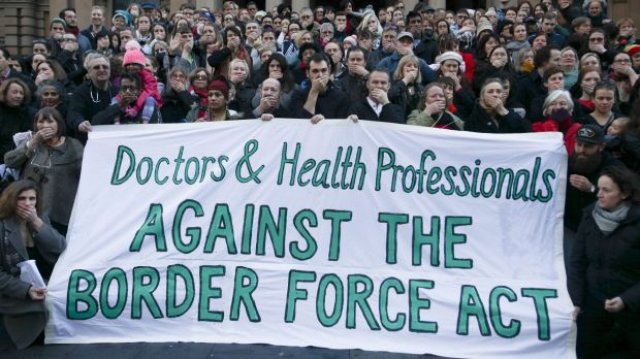
Doctors and health professionals, with community support, have won a significant victory against the government’s agenda of suppression, fear and secrecy. Health professionals have been made exempt from the secrecy and disclosure provisions of the Border Force Act.
This win comes weeks before a national protest led by health professionals demanding the humane treatment of refugees and asylums seekers and the repeal of section 42 of the Border Force Act. It also comes in the context of an impending High Court challenge by Doctors4Refugees to the constitutional basis of the Border Force Act.
Section 42 of the Border Force Act, introduced in July last year, gags people working in detention centres from speaking about the conditions in the centres, with the threat of two years in jail. The exemption given by the secretary of the immigration department only exempts medical professionals and not other workers, such as social workers, teachers and lawyers who are often key sources of information.
The government has provided no explanation as to why medical professionals but not others are exempt. The secretary can reverse the exemption at any time, with no reason given and it does not have to go through parliament.
It is possibly a ploy by the government to strengthen its position in the High Court challenge. Doctors4Refugees is reviewing the court case.
Public Pressure
This decision has to be seen in the context of growing public opposition to the detention system.
When the Act was first announced, people were shocked that reporting a child being raped by a guard was now illegal. The Act contravened doctors’ ethics and stood in direct conflict with their duty of care obligations to their patients.
The government’s seriousness in persecuting detention centre workers who do not sing its tune was already evident last October, when the Australian Federal Police rushed to Nauru, removed several Save the Children workers and confiscated their computers. The allegations levelled against the workers have since been proven false by multiple independent reviews.
Immediately after the Act commenced on July 1 last year, 40 detention centre workers signed an open letter stating they would defy it.
A few weeks later on July 11 and 12 hundreds of medical professionals held protests across Australia from Broome to Bendigo to Coffs Harbour to Newcastle to Melbourne and other rural locations and cities. Health professionals taped their mouths shut, a symbolic statement that it had become illegal to report child abuse, sexual assault and medical negligence.
Since its introduction, health professionals have defied it, continually speaking out about the conditions in detention, including how asylum seekers are deliberately denied critical medical assistance.
From speaking at Palm Sunday rallies, to leaking information to the media, to publishing articles in medical journals, to appearing in the documentary Chasing Asylum, medical professionals have been exposing the atrocities in the detention system, all the while under a cloud of state suppression and with the constant risk of prosecution.
Perhaps the bravest stand was at the Lady Cilento Children’s Hospital in Brisbane in February. Baby Asha was set to be deported back to Nauru after coming to Australia for medical treatment. Doctors at the hospital, in defiance of the government, refused to discharge her until she was able to be sent to a suitable and safe home. They did not consider the Nauru detention centre either safe or suitable. Baby Asha is still in Australia.
It was a key inspirational moment in the #LetThemStay campaign — an upsurge of people from diverse walks of life who took action to present one of the first major political challenges to the policy in a long time.
Now Doctors4Refugees are organising and leading the upcoming Doctors March for Refugees national rally on November 5.
Medical Care
One of the key demands of the march is that asylum seekers and refugees be given comparable medical care to that available in an Australian public hospital.
Offshore detention centres are disease ridden, overcrowded, unhygienic, lacking proper medical facilities and often with little fresh water. When asylum seekers need medical assistance, people who have fled war zones and are now living in inhospitable detention centres, are often denied adequate medical treatment.
This can lead to deaths: 24-year-old Iranian asylum seeker Hamid Khazaei is one such person. Previously healthy, he died of septicaemia in Manus Island detention centre.
It started when he suffered a small cut to his foot. Among the sewage, flooding, tropical diseases, overcrowded tents and sweltering heat, it became infected. He made multiple requests for medical assistance, all of which were denied. He was told there was nothing to worry about by International Health and Medical Services, the private company that has the health contracts for Australia's detention centres.
In an inquest into his death released earlier this year, doctors involved in his treatment said repeated calls for him to be immediately evacuated to Australia when his condition worsened were either delayed or ignored. This probably cost him his life.
This is the reality of the detention system — medical professionals are playing an increasingly important role in exposing the inhumanity of detention and building the refugee campaign.
The government exempting medical professionals from the Border Force Act shows the campaign is having an effect.
The November 5 Doctors’ March for Refugees is the next major protest to keep this pressure growing to bring them here and free the refugees.
Like the article? Subscribe to Green Left now! You can also like us on Facebook and follow us on Twitter.